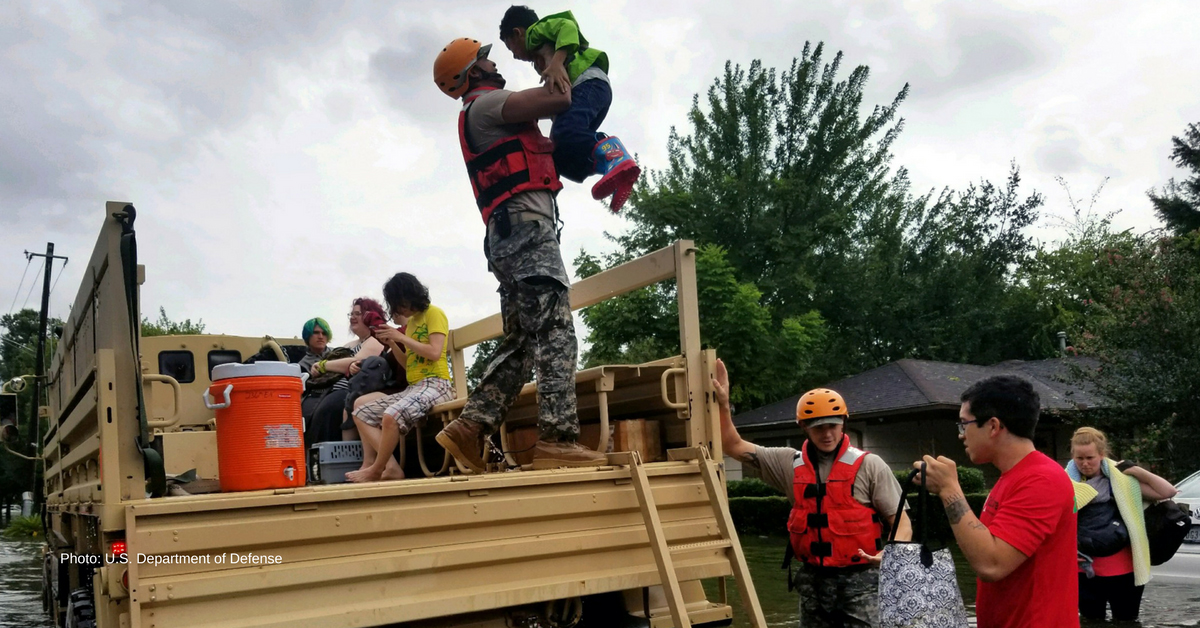Hurricane Harvey’s impact on Child Protective Services (CPS) and foster care – and the children who rely on our child welfare system – is just starting to come into focus. In many ways, the impact illustrates the challenges that other state government functions and policies face in the wake of this natural disaster, from juvenile justice to mental health to schools and beyond.

CPS, other state agencies, their partners, and policymakers are admirably working to implement immediate solutions to crises created by the hurricane while simultaneously developing longer-term solutions. This effort has led some dramatic moments, like the helicopter delivery of infant formula to a medically fragile child in foster care, as reported by the Dallas Morning News, as well as many long of hours of hard work under difficult circumstances. And in many cases, CPS staff and others been doing this work with their offices or homes under water.
Drawing on our conversations with stakeholders in the Gulf Coast, communications from CPS, and other sources, this blog outlines a few of the short and longer-term CPS challenges that state leaders and CPS staff – and all of us focused on the needs of Texas children – have to contend with.
For further insights on the challenges facing CPS in the wake of Harvey and the agency’s response to the crisis, take a look at this recent story in the Texas Tribune and this one in the Dallas Morning News.
When the Gulf Coast region is in trouble, it means a huge proportion of our state is in trouble. Four CPS regions (Regions 5, 6, 7, and 11) were seriously affected by the storm. These four areas are home to about 40 percent of children in foster care. Forty-three percent of CPS employees work in these regions.
Many children relying on CPS have been displaced, but – just like our public schools, our Early Childhood Intervention (ECI) program, and other services – the state must continue to serve them regardless of where they are today, next week, or next month. CPS has attempted to contact all Gulf Coast families and caregivers serving children in foster care. Based on the responses the agency has received as of a few days ago, they have tallied up at least 1,590 children in foster care who were forced to flee the storm. All of them are safe.
The 1,590 includes approximately 400 children who were evacuated from residential facilities. CPS reports that all children that were being served in residential treatment centers (RTCs) at the time of the hurricane are now in those or other RTCs. A total of 41 children remain evacuated from three general residential operations (GROs), Boys Haven, Girls Haven, and Buckner.
The process of identifying all children in the CPS system is ongoing. The agency is staffing shelters in Houston and Dallas, which is helping them identify and locate children and families that had to evacuate. However, the Red Cross’ “paper and pen” registration process at shelters is making it difficult for CPS to get complete data. CPS is working with FEMA, Red Cross, and Safe and Well to locate displaced families. CPS is also relying on CASA and Child Placing Agencies to follow up with families in their networks to account for kids and make sure they are safe and have the resources they need.
CPS staff have successfully contacted 459 foster families caring for children with the most significant medical needs and are continuing to reach out to 19 families that they have been unable to reach. Daily situational reports from the agency indicate that the Medicaid health care system serving children in foster care is working to ensure medication refills are available, nutritional needs of children are being met, children receiving inpatient care are safely transferred, and more.
In addition to serving children in foster care who fled the storm, CPS must also continue to perform investigations, find children who attempted to run away during the storm, and work with those families who were receiving family support services to help prevent abuse, neglect, and the removal of their children. CPS is working hard to make contact with these biological parents and other relative caregivers they have been serving. According to the Department, all the children who ran away during the hurricane have been successfully located, but CPS is still trying to locate one child in Harris County who ran away before the storm.
Serving displaced children and families raises numerous challenges. For example, if a Houston family is staying in a shelter in San Antonio or at a relative’s house in Austin, they may not be able to work with their Houston-based caseworker and service providers. Currently, CPS is coordinating with staff and partners in other parts of the state – including CASA, other private providers, and law enforcement – to carry out functions normally provided by CPS investigations, foster care, and family support caseworkers.
Displacement of foster families poses a particular challenge. When children are placed with foster families, the family and the physical home must be approved. If a family is now living in a shelter, hotel room, or relatives’ home, their foster children can only remain with them if CPS approves the location.
Harvey did significant damage to the state’s child welfare infrastructure, ranging from CPS offices to foster homes to courthouses. Local offices of DFPS (CPS’ parent agency) are shut down indefinitely due to storm damage. On September 5, 19 DFPS offices reopened. The storm battered foster homes, residential treatment centers, and other places where children in foster care live. Some of the facilities that were evacuated are closed indefinitely, such as Hope’s Path’s We Care Residential Treatment Center in Houston. At least two residential child care facilities need to relocate and three need to rebuild. We still don’t know how many foster homes are uninhabitable and how many children will need to be temporarily or permanently relocated.
At least eleven providers or faith communities have offered up vacant space for children and families in need. This is a generous start, but it is not going to be enough.
The loss of homes and the emotional trauma of the hurricane likely means that some families who were serving as foster parents or preparing to serve as foster parents will now back out. We have heard anecdotally this is already beginning to happen. As a result, the state’s shortage of appropriate foster homes may grow more acute. Recruiting and training foster families is going to be more important than ever.
We are still learning about the fate of the infrastructure for services that sometimes interact with children in the care of CPS, such as juvenile justice, mental health, and medical facilities. We do know the Harris County juvenile court is closed down. Like other courthouses, it is used to store CPS case files and hold hearings that decide the future of children in both CPS and the juvenile justice system. When the hurricane struck, 41 children in CPS care were in juvenile justice facilities. Fortunately, none of the juvenile justice facilities have reported any hurricane-related problems to CPS. According to DFPS, all children in CPS who were in psychiatric hospitals have been contacted and no issues have been identified. But likely many of these buildings and homes will need costly renovations or replacements, and in the meantime the Texas children must be served.
That damaged infrastructure facing CPS, our schools, and other children’s services isn’t just buildings – it’s also their workforce. Late last year, and during the regular legislative session earlier this year, the Legislature and Governor Abbott recognized the importance of stabilizing the CPS workforce. Lawmakers invested in hiring more caseworkers and boosting salaries to cut down on turnover. So far, the data suggests that the plan has worked, reducing caseloads for CPS caseworkers investigating possible abuse.
But when the hurricane hit, CPS caseworkers and other critical state employees were forced to evacuate their homes. Many likely lost their homes. Each one of them has a case file of vulnerable kids who are counting on them. CPS reports that in Regions 5 and 6 (the Beaumont/Port Arthur region and the Houston region), 10 to 14 percent of caseworkers and supervisors for investigations, family support, and foster care have not been able to return to work. As those caseworkers struggle to get back home and back to work, or take refuge in other areas of the state, CPS will face a challenging task of continuing to serve each child in its care and keeping caseloads manageable.
Reports of neglect or abuse are likely to rise as families cope with the trauma and material loss caused by the hurricane. Parents and children are both coping with significant trauma and toxic stress from the hurricane. The hurricane is also making it harder for parents to provide clean diapers, adequate meals, stable homes, and other basics for their children. As CPS receives reports about these families it must be prepared to respond in a way that recognizes the economic and emotional toll of the hurricane, supports families in need, and keeps children safe. CPS’ Statewide Intake staff is tracking how many reports of abuse and neglect are related to the storm so they can be handled with appropriate sensitivity. CPS must ensure the response includes the full array of health and human services supports that CPS typically depends on to stabilize at-risk families. Policymakers must ensure these services aren’t pushed to the back burner while they focus on efforts with a more direct link to hurricane recovery.
Trauma-informed care and mental health support will be more important than ever in the wake of the hurricane. Everyone working in the CPS system and in other systems dealing with kids – from juvenile justice to our public schools – needs to understand trauma and how to provide children with trauma-informed care. Schools should be equipped with mental health services that can meet the needs of students who have experienced serious trauma from the hurricane. We’re glad to see that districts like Houston ISD recognize this challenge and are working to address it.
As children and families struggle to rebuild their lives, Texas must ensure that CPS, health and mental health care, Early Childhood Intervention for kids with disabilities, food for hungry kids, and other basic services are stronger than ever. Making sure all our basic services are functioning as well as possible will make it easier for kids and families to recover from the hurricane (and help keep kids out of the CPS system). That’s why we’re glad to see that Houston ISD is offering three meals per day to all students this year. As state budget-writers consider hurricane-specific needs such as rebuilding infrastructure, or face a potential dip in state revenue due to the hurricane, they must commit to providing children and families with the basic services they need now and in the future as well.



